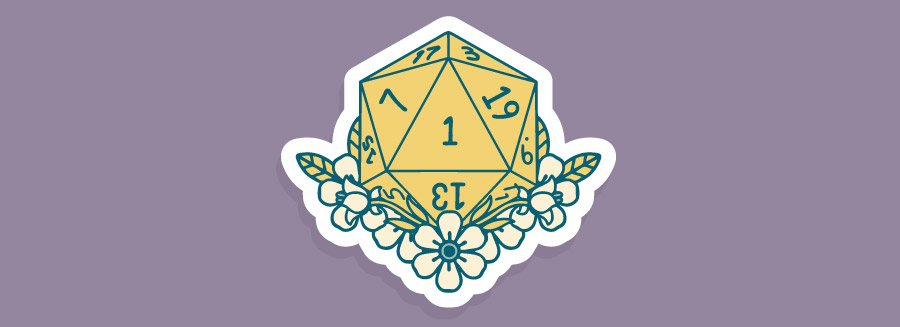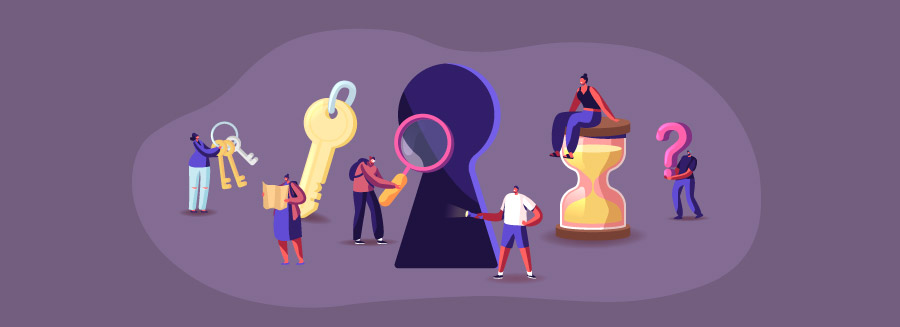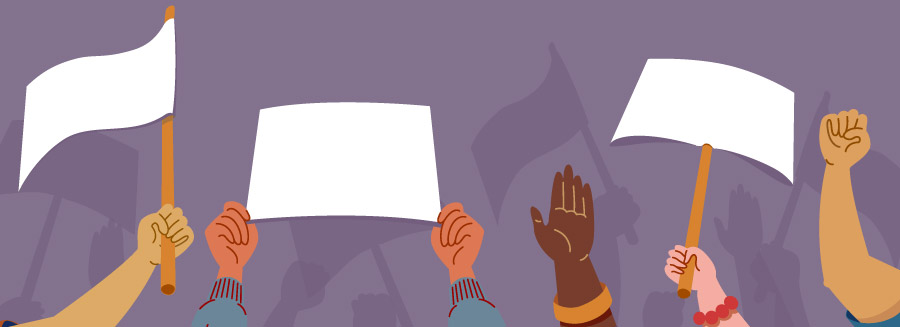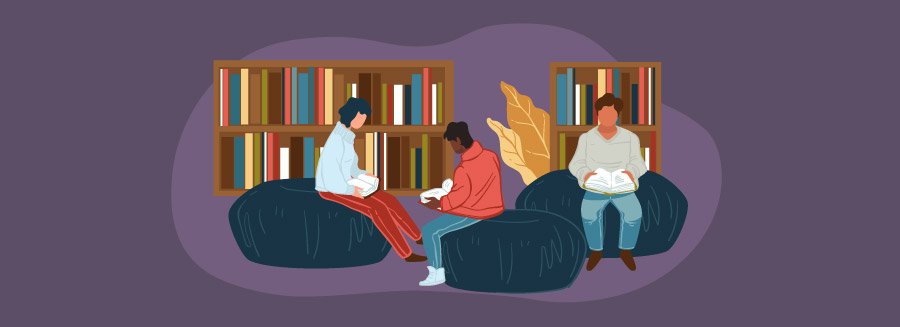
When the pandemic hit, the world changed drastically. I went from working full-time as a school librarian, studying as a graduate student, and working part-time at the university’s library to being ordered to shelter inside the one-bedroom apartment that I shared with my husband and our dog. My days, which were once fully booked and overstimulating, were now quiet and full of free time. What was I supposed to do with all this leisurely time free of responsibility? For a while, I filled that time with long walks outside with our dog, reruns of “Mad Men,” and board games with my husband. It was great for a few weeks, but after a while, we both craved more. Fortunately for me, we weren’t alone in those feelings. A friend reached out to me and asked if I was still looking for a Dungeons and Dragons party to join. He and some friends were going to start a new campaign over Zoom. I wasn’t sure. I definitely wanted to play, but I was nervous about starting something so complex with people I didn’t know. I didn’t want to be socially awkward or make the game less fun because I didn’t read fantasy books. What I didn’t realize was that by saying yes, I would be making a life-changing decision. Thank goodness for that barbarian and friend, Bogrod, and the creation of Zoom. The game has not only changed the way I look at gaming, but it has also influenced the way I create programming in my library.
Library programming is one of the easiest ways to incorporate personal voice and creativity into your space. I find that my most successful programming comes from my own passions. Here are some of the ways I use Dungeons and Dragons (D&D), and other activities based on my favorite things, in my space.
Dungeons and Dragons
D&D is a popular fantasy tabletop role-playing game that has been around since the 1970s. The game has never been more popular, thanks to things like the internet, Netflix’s “Stranger Things,” and movies about elves. But you don’t have to be a fantasy fan or a gamer to love D&D. It is about hanging out with friends, creating a world together, investing your time and mind into something, and learning about yourself along the way. That is why I think it belongs in every library. When done correctly, the play that comes with D&D can open the door to countless possibilities for learning. While I don’t have any concrete evidence to prove that playing D&D makes you smarter, I can tell you that there are plenty of anecdotes that would argue its validity.
Hosting a weekly space for young people to come and play out a campaign can help them in many ways. In fact, D&D can improve skills such as literacy, math, and emotional literacy. D&D is grounded in literacy. If you take a close look at the process, you will find that literacy is woven throughout the span of a D&D campaign. Antero Garcia, an associate professor at Stanford University, believes there are three specific times it occurs: within the game (understanding the languages and tasks you might find in your world), at the table (speaking, reading through rules, record-keeping), and beyond the table (reflecting on what happened and thinking about what could have happened differently). All these skills—speaking, listening, reading, and writing—are ones that I would work diligently to teach my students over the course of the year when I was in the classroom. Although a character has a background story created by the player, they are only as strong as their skills and modifiers. At its core, D&D is a numbers game. It encourages players to think creatively and apply mathematical concepts in practical situations. The math involved is constant, and it keeps the storyline moving along. This improves skills such as basic arithmetic, probability, and geometry. Finally, our young people have been through a lot over the last few years. Being a teenager is hard enough, but we added a global pandemic to it, which really strained the emotional literacy and coping skills of many of our students—and even some adults! Emotional literacy refers to the ability to recognize, understand, and express emotions in a healthy and effective way. It involves being aware of your own emotions, as well as the emotions of others, and being able to manage them appropriately. D&D can help nurture this ability through role-playing, social interaction, collective storytelling, and problem-solving.
Escape Rooms
Another example of passion-based programming I have used in my school is incorporating escape room-style lessons and activities. Escape rooms have grown in popularity over the years. They are great for critical thinking, team building, and experiencing something out of the ordinary. My own fascination with escape rooms started when I was a teacher in Cleveland, Ohio. I knew my new principal was innovative, but I didn’t realize how cool she really was until the first week of school. The staff had grown a lot that year, and instead of hosting traditional professional development, she sent each grade level team into their own escape room. It was a great icebreaker for the new teachers and offered me a unique view of how team building and experiences could happen in a school setting.
A few years later, I moved from the classroom to the library. My escape room experience had inspired me to create smaller and curriculum-specific virtual escape room activities for my classes, but the library felt bigger. In a school of 2,000, I was tasked with recreating a freshman orientation that would work for our 500 ninth graders. It took me weeks to visualize, plan, and implement, but creating an escape room-style orientation remains one of my favorite accomplishments! I wanted young people to enter our school for the first time and remember their time in the library. I wanted to stand out as a place that was inclusive, unique, and lively. Through puzzles and a scavenger hunt, young people were able to locate important library features, meet their librarians, use our online catalog, and check out a book without sitting through a slideshow! It is a huge hit at the beginning of every year, and the freshman teachers fight to be the first to schedule it. It might feel overwhelming at first, but there are plenty of resources out there. You can create your own from scratch or modify something else that you find online. One of my favorite resources is a book called Escape Rooms and Other Immersive Experiences in the Library by Ellyssa Kroski with examples and templates to use. While I haven’t personally used a BreakoutEDU box for orientation, I have used it for other lessons, and I know that it is also a great tool with premade games.
Advocacy Through Book Clubs
One thing that I have discovered about myself throughout my time in education is that I have a passion for advocacy. In today’s constantly changing world, it is more important than ever to teach our young people that they do have a voice and that it is worth listening to. I’ve had to get creative with how I approach this over the years, and I believe that I found it in my most popular piece of programming: Project LIT Book Club. Project LIT is a grassroots literacy movement that started with a teacher, his class, and an article about book deserts in Nashville, TN. What began in one school has grown into an international club that empowers students as readers, writers, and leaders. It promotes a love of reading, nurtures authentic reading identities by increasing access to high-quality books, builds community and fosters a sense of belonging, and advocates for literacy policies and practices that will build lifelong readers, among many other things. Over the last six years, I have hosted some variation of Project LIT in my school. It has evolved and changed as the young people and the world have shifted. It started off as a book club that met once a month. We would vote on a book from the list, pick a date, and then invite students, teachers, community members, and any other stakeholders who wanted to celebrate with us! On the big day, we would have discussion questions ready to go, book trivia, and snacks.
In 2023, the club looks a little different. While we still have our monthly book club meetings, we have added an additional tier to the program. Our school follows an A/B schedule, and we have designated B days for our book club activities. On these days, we focus on the book of the month. Sometimes that involves reading it together, discussing the chapters of the week, making crafts related to the book, or whatever makes the most sense at the time. On A days, however, we have included advocacy days. These days are reserved for discussing legislation that might affect young people, finding and contacting legislators, and inviting them to speak to us. It is important to me that young people have the tools to be active members of society. They deserve to know who their legislators are and how they can contact them. This part of the programming has been hugely impactful for our school and our young people.
The Public Library
I can’t help it—I love libraries! I work in a school library, but you will probably find me and my daughter at one of our local branches on the weekend. While I deeply believe in the work that I am doing, I also know that the public library is just as important. I want to ensure that I create a partnership between my young people and the librarians at the local branch. A few years ago, I met with those librarians, and we have been having monthly visits from them ever since. Before the school year starts, we sit down and plan out their visits for the entire year. It is important to me that we are consistent and building community. Each month, they set up shop in our library for a few hours with a new craft or activity. It has been magical to see young people transition from the school library to the public library.
Some other big hits inspired by my own fascination include: True Crime Tuesday, Environmental Club, First Chapter Friday, and board game events. While I believe that our passions should shine through in programming, I also think it is important to make sure that the young people are enjoying the content. Like with anything in the library, it is important that the space represents the patrons who use it.
If you are looking for more support for creative programming, or if you ever just want to talk about D&D, feel free to reach out! You can email me at tysidney@gmail.com or connect on Twitter @MrsTylerSainato.









